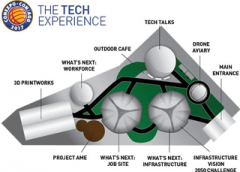When you go to next year’s ConExpo-Con/Agg 2017 show, be sure to visit the new Tech Experience exhibit to see the future of the construction industry, and uncover how your business can become more profitable and more efficient.
Emerging technologies include:
- Cloud-based systems.
- Artificial intelligence.
- New materials that can be used to enhance the nation’s infrastructure.
- New safety and productivity technology.
Connect Equipment to the Cloud
While there are a number of examples of how equipment is becoming connected, one new example is taking it a step further by offering digitally enabled sensing and connection to the cloud.
Mahindra & Mahindra Ltd., part of the Mahindra Group, launched a connected-vehicles technology platform, called DiGiSENSE, which connects vehicles, tractors, trucks and construction equipment to the cloud. The platform has digitally enabled sensing and enables owners, fleet operators, drivers, dealers, and service teams to access data about construction equipment in real time.
In addition to tracking vehicle performance and location, drivers can also contact emergency breakdown services or pull up a route planner. Additionally, remote diagnostics and reports allow users to monitor a vehicle’s health and productivity parameters.
The company has also created an ecosystem of technology partners like a cloud service provider, map provider, telecom network provider, hardware manufacturer, and other third parties. Mahindra is also redefining the service paradigms.
The technology is available in Earthmaster construction equipment and as a subscription-based service. Key features include route planning, utilization reports, trip optimizations, geofencing, and alerts and machine hour operations.
While this is just one example, many equipment manufacturers are incorporating technology into vehicles. The end result is greater productivity and efficiency for the construction industry.
Artificial Intelligence
Often, the concept of artificial intelligence (AI) and robotics are combined into one futuristic notion of how advanced intelligence and technology will impact business.
However, the concepts – each very different in nature – serve a specific purpose on construction jobsites today and will only expand in the future.
How will artificial intelligence (AI) impact the construction industry? It is important to identify where we have been and where we are going with regards to AI in construction.
Dan Kara, research director – robotics, ABI Research, said many consider robotics to be a subset of artificial intelligence – but it is not. “Robotics systems, those technologies that sense, think and then act in the physical world, can make use of artificial intelligence techniques such as machine learning for the ‘thinking’ component, but it is not a necessity,” he explained. “In fact, most of the robotics systems in operation today do not. That will change, of course.”
At its core, Kara said, robotics are becoming more common on jobsites for applications such as bricklaying, concrete dispensing, welding, demolition, and more. This trend is seen in numerous analyst reports as well. Organizations, including market research company Technavio, are forecasting that increased R&D spending will boost global robotics.
In addition, as these robots and robotics technologies become more autonomous and intelligent through the use of AI techniques, they will be used in a growing number of new construction applications, explained Kara.
Digging into this a bit deeper, the construction industry is set to benefit in two distinct ways. The first is that AI will support many of the functions common to all business, such as human resources. Second, AI can help with business management to determine demand forecasting and scheduling.
AI techniques can also be used to optimize development and quality control testing of products and design structures.

